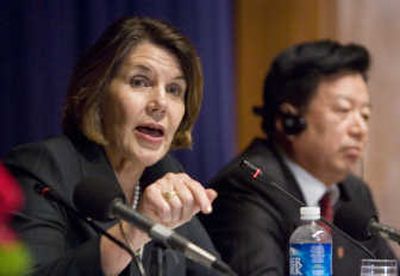U.S., China agree to toy export efforts

WASHINGTON – Amid heightened concern about the safety of foreign products, the U.S. and Chinese governments agreed in writing Tuesday on measures to prevent future export of Chinese-made toys containing lead paint to the United States.
The pact, announced at the second U.S.-China consumer product safety summit, calls for the U.S. Consumer Product Safety Commission and China’s General Administration of Quality Supervision, Inspection and Quarantine to develop a comprehensive plan to assure that Chinese exports comply with a 1978 U.S. law that bans lead paint in toys.
In the past month, millions of Chinese toys sold by Mattel were recalled because of dangerously high levels of lead paint.
In addition, the U.S. and China agreed to develop new procedures to address recurring quality and safety problems with Chinese-made lighters, fireworks, electrical products and other toys.
Acting consumer commission Chairman Nancy Nord said there would be more inspections of U.S.-bound products, efforts to educate Chinese manufacturers and exporters on U.S. product safety standards, more training on product testing methods, and regular information exchanges.
In addition, China agreed to help trace products with safety problems to the companies that manufacture, distribute and export them.
Nord said private industry in both countries must take greater responsibility, as well, by conducting more product safety tests and purchasing materials from reputable suppliers.
“No longer can industry tolerate an ask-no-questions mentality when making, ordering and purchasing products,” she said. “Everyone in the chain of commerce has a legal and moral obligation to ensure that the products that end up in the consumers’ hands, especially in the hands of children, are safe. The stakes are just too high.”
Chuanzhong Wei, vice minister of China’s General Administration of Quality Supervision, Inspection and Quarantine, signed the new agreement and acknowledged that there are “indeed some quality problems with individual products.” But he added: “We are actively taking effective (action) to resolve those problems.”
He said China’s recent recalls and safety problems stem from differences in Chinese and U.S. standards for quality and safety and from poor product designs by foreign manufacturers. But he also cited “distorted reports” about Chinese products, which he said have hurt the country’s reputation as a trade partner.
Tuesday’s agreement comes shortly before the holiday shopping season, and Nord reassured U.S. consumers that they can shop with the confidence that the toys they buy are safe.
While the new agreement takes effect immediately, some experts say the accord won’t be fully in place for the holiday shopping season since most toymakers have already begun or will soon begin shipping their holiday orders.
“The big question is what percent of toys on shelves for the holidays will be covered by the new initiative,” said Janell Mayo Duncan, senior counsel for Consumers Union, a watchdog agency. “And what assurances do we have that toys on the shelves now don’t have high levels of lead paint?”